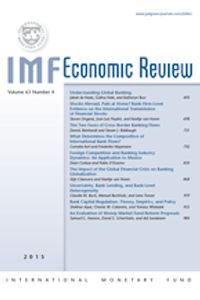
Corsetti, G., Kuester, K. and Müller, G. J.
Fixed on Flexible Rethinking Exchange Rate Regimes after the Great Recession
IMF Economic Review
Vol. 65(3) pp. 586-632 (2017)
Abstract: The zero lower bound problem during the Great Recession has exposed the limits of monetary autonomy, prompting a re-evaluation of the relative benefits of currency pegs and monetary unions (see, e.g., Cook and Devereux in Journal of International Economics 101:52–69, 2016). We revisit this issue from the perspective of a small open economy. While a peg can be beneficial when the recession originates domestically, we show that a float dominates in the face of deflationary demand shocks abroad. When the rest of the world is in a liquidity trap, the domestic currency depreciates in nominal and real terms even in the absence of domestic monetary stimulus (if domestic rates are also at the zero lower bound)—enhancing the country’s competitiveness and insulating to some extent the domestic economy from foreign deflationary pressure.
Keywords: External shock, Great Recession, Exchange rate, Zero lower bound, Exchange rate peg, Currency union, Fiscal Multiplier, Benign coincidence
JEL Codes: F41, F42, E31
Author links: Giancarlo Corsetti
Publisher's Link: https://doi.org/10.1057/s41308-017-0038-0 ![]()
Cambridge-INET Working Paper Version of Paper: Fixed on Flexible Rethinking Exchange Rate Regimes after the Great Recession, Corsetti, G., Kuester, K. and Müller, G. J., (2017)
